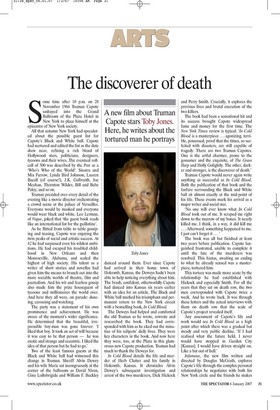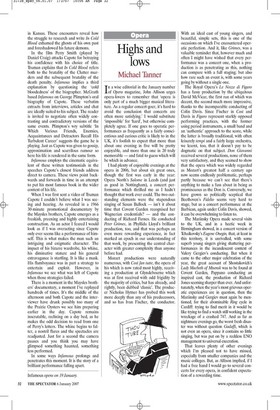The discoverer of death
A new film about Truman Capote stars Toby Jones. Here, he writes about the tortured man he portrays Some time after 10 p.m. on 28 November 1966 Truman Capote sashayed into the Grand Ballroom of the Plaza Hotel in New York to place himself at the epicentre of New York society.
All that autumn New York had speculated about the possible guest list for Capote's Black and White ball. Capote had nurtured and edited the list as the date drew near, refining a rich blend of Hollywood stars, politicians, designers, tycoons and their wives. The eventual rollcall of 500 was described by the Post as a 'Who's Who of the World': Sinatra and Mia Farrow, Lynda Bird Johnson, Lauren Baca11 (of course!), J.K. Galbraith, Joe Meehan, Thornton Wilder, Bill and Babe Paley, and so on.
Truman presided over every detail of the evening like a movie director orchestrating a crowd scene at the palace of Versailles. Everyone would be masked and everyone would wear black and white. Leo Lerman, of Vogue, joked that `the guest book reads like an international list for the guillotine'.
As he flitted from table to table gossiping and teasing, Capote was enjoying the twin peaks of social and artistic success. At 42 he had surpassed even his wildest ambitions. He had escaped his troubled childhood in New Orleans and then Monroeville, Alabama, and scaled the highest of high society. His talent as a writer of short stories and novellas had given him the means to branch out into the more sociable worlds of theatre, film and journalism. And his wit and fearless gossip also made him the prize houseguest of tycoons and millionaires the world over. And here they all were, on parade: dancing, carousing and watching.
The party was a statement of his own prominence and achievement. He was aware of the moment's wider significance. He determined that the beautiful, irrepressible boy-man was gone forever: 'I liked that boy. It took an act of will because it was easy to be that person — he was exotic and strange and eccentric. I liked the idea of that person but he had to go.'
Two of the least famous guests at the Black and White ball had witnessed this change in Truman. Sheriff Alvin Dewey and his wife Marie sat incongruously at the corner of the ballroom as David Niven, Gina Lollobrigida and William E Buckley danced around them. Ever since Capote had arrived in their home town of Holcomb, Kansas, the Deweys hadn't been able to help noticing everything about him The brash, confident, otherworldly Capote had danced into Kansas six years earlier with an idea for an article. The Black and White ball marked his triumphant and permanent return to the New York circuit with a bestselling book, In Cold Blood.
The Deweys had helped and comforted the old Truman as he wrote, rewrote and researched the book. They had corresponded with him as he eked out the minutiae of his subjects' daily lives. They were key characters in the book. And now here they were, too, at the Plaza in this glamorous new Capote production. Truman had much to thank the Deweys for.
In Cold Blood details the life and murder of Herb Clutter and his family in Holcomb, Kansas. It chronicles Alvin Dewey's subsequent investigation and arrest of the two murderers, Dick Hickock and Perry Smith. Crucially, it explores the previous lives and brutal execution of the two killers.
The book had been a sensational hit and its success brought Capote widespread fame and money for the first time. The New York Times review is typical: 'In Cold Blood is a masterpiece. . . agonizing, terrible, possessed, proof that the times, so surfeited with disasters, are still capable of tragedy. There are two Truman Capotes. One is the artful charmer, prone to the gossamer and the exquisite, of The Grass Harp and Holly Golightly. The other, darker and stronger, is the discoverer of death.'
Truman Capote would never again write anything as successful as In Cold Blood. Both the publication of that book and the fanfare surrounding the Black and White ball sit almost exactly at the mid-point of his life. These events mark his arrival as a major writer and social star.
'No one will ever know what In Cold Blood took out of me. It scraped me right down to the marrow of my bones. It nearly killed me. I think, in a way, it did kill me . . . Afterward, something happened to me. I just can't forget it. .
The book was all but finished at least two years before publication. Capote languished frustrated, unable to complete it until the fate of the murderers was resolved. This hiatus, awaiting an ending to what he already sensed was a masterpiece, tortured him This torture was made more acute by the relationship he had established with Hickock and especially Smith. For all the years that they sat on death row, the two men corresponded with Capote twice a week. And he wrote back. It was through these letters and the actual interviews with them on death row that the scale of Capote's project revealed itself.
Any assessment of Capote's life and work would see In Cold Blood as a high point after which there was a gradual but steady and very public decline. 'If I had realised what the future held, I never would have stopped in Garden City [Kansas]. I would have driven straight on. Like a bat out of hell.'
Infamous, the new film written and directed by Douglas McGrath, explores Capote's life through the complex personal relationships he negotiates with both his New York circle and the friends he makes in Kansas. These encounters reveal how the struggle to research and write In Cold Blood exhumed the ghosts of his own past and foreshadowed his future demons.
In the film Perry Smith (played by Daniel Craig) attacks Capote for betraying his confidence with his choice of title. Truman explains that In Cold Blood refers both to the brutality of the Clutter murders and the subsequent brutality of the death penalty. Infamous implies a third explanation by questioning the 'cold bloodedness' of the biographer. McGrath based Infamous on George Plimpton's oral biography of Capote. These verbatim extracts from interviews, articles and chat are ideally suited to his subject. The reader is invited to negotiate often widely contrasting and contradictory versions of the same events. Plimpton's wry subtitle 'In Which Various Friends, Enemies, Acquaintances and Detractors Recall His Turbulent Career' suggests the game he is playing. Just as Capote was given to gossip, approximation and scurrilous rumour so here his life is rendered in the same form.
Infamous employs the cinematic equivalent of these written testimonials in the speeches Capote's closest friends address direct to camera. These views point backwards and forwards in time in an attempt to put his most famous book in the wider context of his life.
When I was first sent a video of Truman Capote I couldn't believe what I was seeing and hearing. As revealed in a 1966 30-minute promotional documentary by the Maysles brothers, Capote emerges as a freakish, preening and highly entertaining construction. As an actor I feared I would look as if I was overacting since Capote only ever seems like a performance of himself. This is what makes the man such an intriguing and enigmatic character. The impact of his bizarre wardrobe, his whine, his diminutive stature and his general extravagance is startling. It is like a mask. His flamboyance was in part a strategy to entertain and exploit. However, in Infamous we see what was left of Capote when those strategies failed.
There is a moment in the Maysles brothers' documentary, a moment I've replayed hundreds of times. It's the middle of the afternoon and both Capote and the interviewer have drunk possibly too many of the Prairie Oysters we see him preparing earlier in the day. Capote remains inscrutable, reclining on a day bed, as he makes the odd decision to read from one of Perry's letters. The whine begins to falter, a nostril flares and the spectacles are readjusted. Just for a second the camera pauses and you think you may have glimpsed something haunted, something less performed.
In some ways Infamous prolongs and penetrates this moment. It is the story of a brilliant performance falling apart.





































 Previous page
Previous page